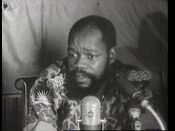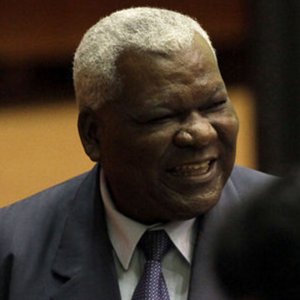President of Batisuria: Difference between revisions
No edit summary |
|||
| Line 64: | Line 64: | ||
|- | |- | ||
|colspan=5 align=left|The leader of the Marensais Peoples' Liberation Army during the Bush Wars, Adewale was largely responsible for guiding the development of the early PDR and creating precedent for both the role of the President but also that of the government institutions to come, first as Marshall of the PLA, Provisional Executive, and then President, though his is a complicated legacy at home and abroad. Adewale won by a landslide in the first ever general elections in Marensoald. {{small|}} | |colspan=5 align=left|The leader of the Marensais Peoples' Liberation Army during the Bush Wars, Adewale was largely responsible for guiding the development of the early PDR and creating precedent for both the role of the President but also that of the government institutions to come, first as Marshall of the PLA, Provisional Executive, and then President, though his is a complicated legacy at home and abroad. Adewale won by a landslide in the first ever general elections in Marensoald. {{small|}} | ||
|- | |||
|- bgcolor=#EEEEEE | |||
!rowspan=2 style="background:#FF6666;"|2 | |||
|rowspan=2| | |||
|rowspan=2|'''Muraty Khalfani'''<br/><small>(1928-) | |||
|1 January 1979 | |||
|31 December 1988 | |||
|{{age in days|1979|1|1|1989|12|31}} | |||
|style="background:#FF6666;"|U&P | |||
|1978 | |||
|- | |||
|colspan=5 align=left|Khalfani was the primary representative of U&P at the Second Constitutional Assembly in 1977-78, and a personal friend and confidant of Artoir Adewale, who saw him as an appropriate successor who would ensure the continued stability and improvement of the PDR over the 1980s, and more importantly, demilitarize society where his predecessor would not be capable. {{small|}} | |||
|- | |||
|- bgcolor=#EEEEEE | |||
!rowspan=2 style="background:#FF6666;"|3 | |||
|rowspan=2| | |||
|rowspan=2|'''Sebastien Simba'''<br/><small>(1938-1992) | |||
|1 January 1989 | |||
|1 May 1992 | |||
|{{age in days|1989|1|1|1992|5|1}} | |||
|style="background:#FF6666;"|U&P | |||
|1988 | |||
|- | |||
|colspan=5 align=left|Despite his popularity, Simba met an unfortunate end when his convoy was ambushed en route to a {{wpl|May Day}} parade in the nation's capital. It was carried out by the Rashidin, an extremist militia affiliated with the [[Mamba Society]], a highly secretive nationalist group and crime ring which seeks the expulsion of all non-indigenous person from Enewatu. Similar attacks were launched throughout the country over the following weeks to varying degrees of success, in a string of national tragedies known as "Bleeding May".{{small|}} | |||
|- | |- | ||
|} | |} | ||
{{Marensoald}} | {{Marensoald}} | ||
Revision as of 03:17, 5 April 2019
| President of Marensoald Président de Marensoalde | |
|---|---|
| Executive Secretariat of Marensoald Office of the President | |
| Style | Mister/Madam President |
| Member of | |
| Reports to | Parliament |
| Residence | Le Petite Maison, Poste de Flacq 23 Rue-des-Ouvriers, Valjardin Federal Enclave |
| Appointer | Direct Popular Vote |
| Term length | Five Year Term, Renewable Once |
| Formation | 1 October 1958 |
| First holder | Artoir Adewale |
| Salary | 24,575,000 MOŁ |
The President of Marensoald, officially styled President of the Executive Secretariat of the Peoples' Democratic Republic, is the Head of State, Commander-in-chief of the military, and chief representative of the Peoples' Democratic Republic to the rest of the world. The President holds the highest elected office within the nation's Order of Precedence, and leads the Executive Branch of the Marensais Government through the overseeing of the Executive Secretariat. The office is organized as a Semi-Presidential System.
The President is tasked with maintaining the stability, integrity, unity, and safety of government, and Carcosse society as a whole, upholding constitutional law and due process, and ensuring the territorial integrity and independence of the Peoples' Democratic Republic. The President also holds the authority to call for Ordinary and Extraordinary Elections of Parliament as mandated by the Constitution, as well as call for referenda (with the approval of the First Minister). Though it has the ceremonial power to form a government, the President does not appoint the First Minister or any members of Parliament, but is permitted to remove them for violations of Constitutional Law, Oath of Office, or Code of Conduct. In kind, they may also grant pardons, award decorations and rank, and distribute other state-issued awards. The President and Executive Secretariat, as well as the First Minister, cooperate to conduct and dictate foreign policy. In addition, the President is commander-in-chief of the Marensoald Peoples' Defense Force. Leadership of the Executive Secretariat, as well as the Civilian Directors and Military Commanders of national security and defense-related Agencies of the country is appointed by the Secretary-Executor and approved by the Federal Secretariat.
The Office of the President is composed of the President themselves, their immediate staff, as well as its support staff. If incapacitated and incapable of running the Office and its duties, the Secretary of External Affairs becomes Interim Chief of the Executive Secretariat until ready to return to their duties, or until the completion of a special election 90 days following the declaration of a Permanent Leave of Absence by the elected Secretary, family, or other legal representatives. The Executive Secretariat is located at the House of Secretaries in the Federal Enclave District of Valjardin, The Traditional Residence of the Secretary-Executor is the Petite Maison, a private estate located in Poste de Flacq, a smaller municipality located on the outskirts of Lukubwa proper, while a Presidential Apartment at 23 Rue-des-Ouvriers is located within the Federal Enclave during sessions of government which require the President's attendance.
The President is elected to office by basis of Universal Suffrage, through a secret ballot, for a five-year term, with the option to run for re-election for a second. If no candidate attains a majority beyond 50% (including blank and spoilt ballots), a runoff election will be held between the top three candidates. Elections for the Office take place every five years on 2 October, and Runoff Elections must take place before 1 November. Prior to beginning their term in office, the President-Elect must take a public Oath of Office before members of the Parliament, Federal Court, and members of the general public. Upon election, the President-elect must also resign from all other positions, public and private, excluding their political party.
History
Powers, Duties, and Responsibilities
Office of the President
Election and Taking Office
Oath of Office
Presidential Elections
Immunity and Impeachment
Vacancy and Incapacity
Symbols
Post-Secretaryship
Timeline of Presidents of Marensoald
| № | President | Term of office | Political Party | Elected | |||
|---|---|---|---|---|---|---|---|
| Portrait | Name (Birth–Death) |
Took Office | Left Office | Days | |||
| 1 | 
|
Artoir Adewale (1913-1994) |
1 October 1958 | 31 December 1978 | 7396 | U&P | 1958 |
| The leader of the Marensais Peoples' Liberation Army during the Bush Wars, Adewale was largely responsible for guiding the development of the early PDR and creating precedent for both the role of the President but also that of the government institutions to come, first as Marshall of the PLA, Provisional Executive, and then President, though his is a complicated legacy at home and abroad. Adewale won by a landslide in the first ever general elections in Marensoald. | |||||||
| 2 | Muraty Khalfani (1928-) |
1 January 1979 | 31 December 1988 | 4017 | U&P | 1978 | |
| Khalfani was the primary representative of U&P at the Second Constitutional Assembly in 1977-78, and a personal friend and confidant of Artoir Adewale, who saw him as an appropriate successor who would ensure the continued stability and improvement of the PDR over the 1980s, and more importantly, demilitarize society where his predecessor would not be capable. | |||||||
| 3 | Sebastien Simba (1938-1992) |
1 January 1989 | 1 May 1992 | 1216 | U&P | 1988 | |
| Despite his popularity, Simba met an unfortunate end when his convoy was ambushed en route to a May Day parade in the nation's capital. It was carried out by the Rashidin, an extremist militia affiliated with the Mamba Society, a highly secretive nationalist group and crime ring which seeks the expulsion of all non-indigenous person from Enewatu. Similar attacks were launched throughout the country over the following weeks to varying degrees of success, in a string of national tragedies known as "Bleeding May". | |||||||
